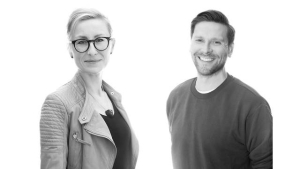AFRY's Future Food – part of the massive food transition
 The multinational company AFRY’s mission is to accelerate the transition to a more sustainable society. A part of this mission is Future Food, an initiative that supports food companies in the hunt, and the race, for new solutions to create a more sustainable food industry. A process in which AFRY’s efforts have become significant.
The multinational company AFRY’s mission is to accelerate the transition to a more sustainable society. A part of this mission is Future Food, an initiative that supports food companies in the hunt, and the race, for new solutions to create a more sustainable food industry. A process in which AFRY’s efforts have become significant.
AFRY is a design and engineering company with 17,000 employees. The company is represented in most of the world and operates in many different sectors, including industry and infrastructure, always with the goal of creating a more sustainable society. AFRY’s Future Food is an important contributing element in the hot debate on climate and the huge shift towards a more circular society.
– The food industry accounts for a large portion of greenhouse gas emissions, which means there is an incredible amount to do in this area. We want to create new types of food and improve and optimise production. We collaborate across departmental boundaries and in Future Food we benefit from our broad expertise within AFRY. We have a large team of experts who are working on how to produce climate-friendly food. We also have people who are experts in production, says Katrin Hedvall, Business Unit Manager Food & Pharma at AFRY.
And AFRY is not alone in looking for innovative solutions throughout the entire production chain. On the other hand, the company possesses an incredibly broad competence that not everyone has.
– The advantage of AFRY is that there are 17,000 employees. People say, “from wheat to loaf”, but our competence extends even further back, before you even have the wheat. We are well placed in a race in which all food companies are working with new proteins and new ideas. It is a fantastically fun journey to be a part of, says Dennis Hågebrand, Section Manager El & Automation at AFRY.
Future Food supports and helps customers with sustainable production. This can be a transition within an already established food company as well as being a scaling-up process for a smaller player. However, the goal is always the same – to create a sustainable way of working.
– It is about finding out where the customers are and what they want. All of our customers operate under different conditions, and their biggest problem is often money. Over the past year, we have worked together with Lejonet and Björnen and digitised their operations by connecting business systems and production. With financial support from the Swedish Agency for Economic and Regional Growth, we will continue the work of digitising production and increasing efficiency. It is also worth mentioning that large investments are not always the best. Small things that cost little can give great results for a long time. We try to capture the by-products of production processes. The customer may think that the water they used to rinse food is a waste product, but we can find ways to use that water, for example. In this way you can find solutions to reduce the climate footprint, says Dennis Hågebrand.
In addition to helping customers in their production chains, AFRY and Future Food are investing a lot of effort in the foods of the future. For AFRY, it is quite clear that we are in the middle of, and facing, a huge change that will affect what is on our dinner plates in future.
– We spend a lot of time thinking about what’s coming next for food, such as how can we make land-based fish farms more circular. We are also seeing a lot of blue food. Blue food includes algae, and we have some such projects under way. Together with a management team and our bio-engineers, we are looking to identify challenges. For example, what is the challenge with lab-grown meat? We want to do everything to help our customers, says Katrin Hedvall.
What will actually be on our dinner plates in the future can, so far, only be predicted. But right now, countless food companies, both established and start-ups, are working to find the best and most sustainable solutions.
– We believe that there will be two tracks. The first track involves trying to find proteins that replace meat products in taste and texture. The second involves trying to find proteins that have exciting flavours but are not meat-like, says Dennis Hågebrand.
– We see great opportunities, for example through the digitalisation of the production process, to be able to reduce food waste. The important thing is that we need to address climate change quickly, collaborating both internally and with other companies, Katrin Hedvall concludes.
Nordic Food Industry is a new meeting place for the entire food sector. Manufacturers, suppliers, industry associations and academia are invited to present new technology, new materials and innovative solutions, products and services, for a sustainable food industry. The Nordic Food Industry trade fair will take place at the Swedish Exhibition & Congress Centre from 18 to 20 October 2022.
Find out more at nordicfoodindustry.se